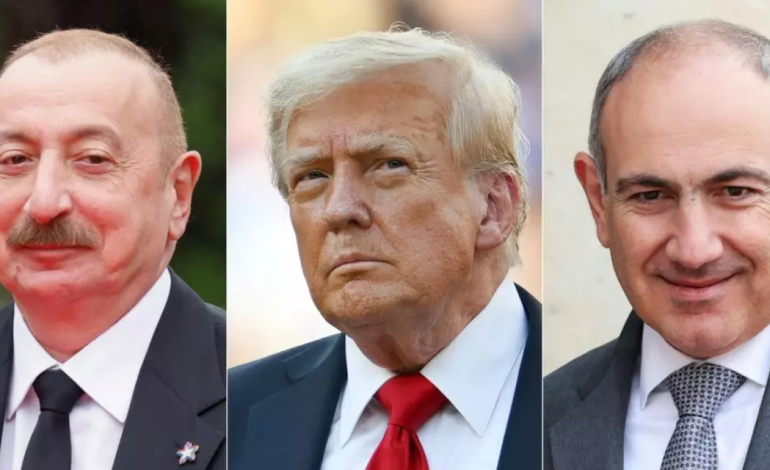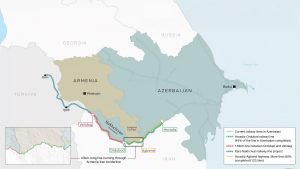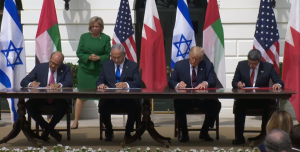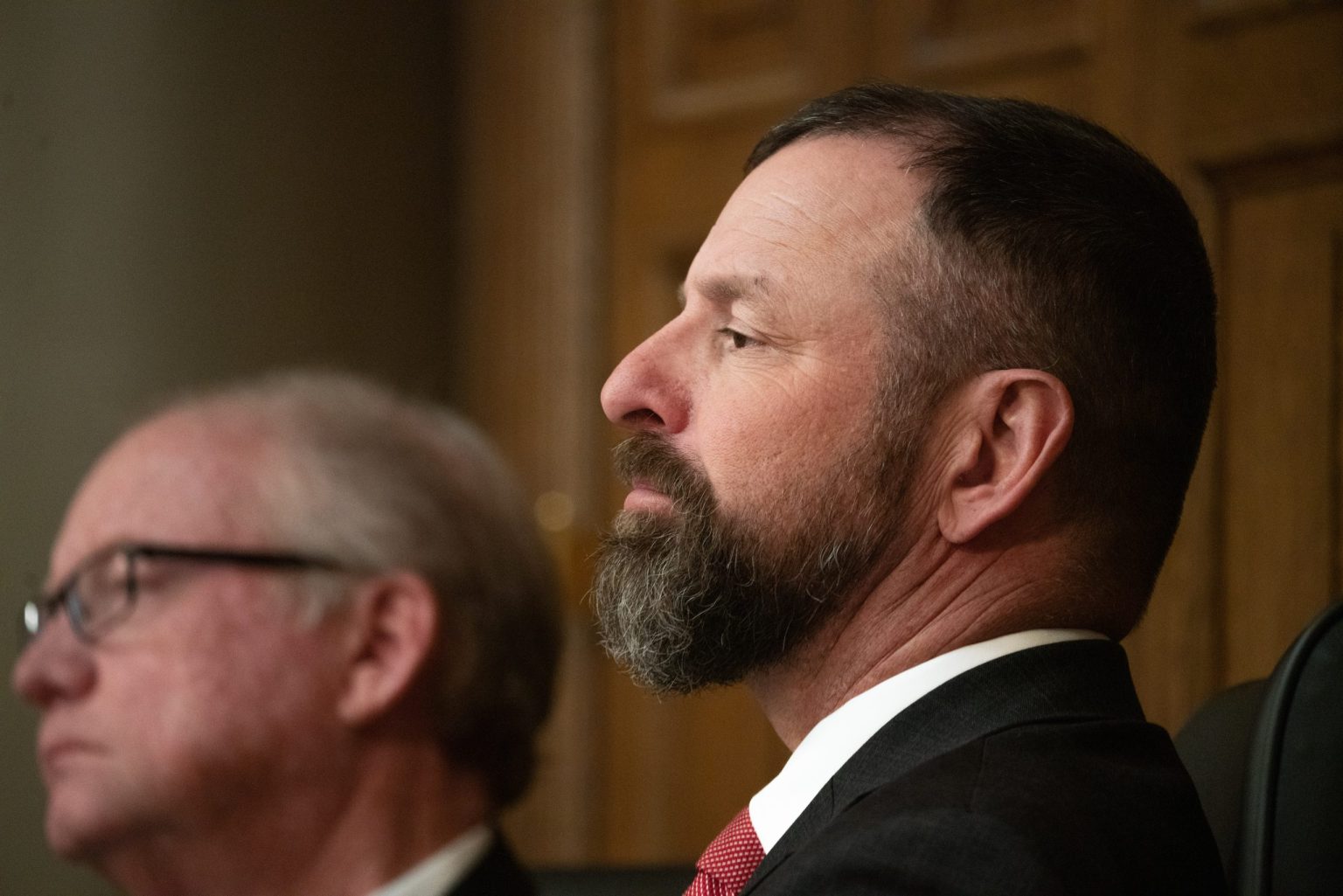EXCLUSIVE: Armenia-Azerbaijan Peace Tied to the Abraham Accords?!

In a world already drowning in tangled alliances and cynical diplomacy, the idea of yoking the Armenia-Azerbaijan peace process to the Abraham Accords feels less like a stroke of diplomatic genius and more like another clumsy maneuver in the theater of American foreign policy. On paper, peace between Armenia and Azerbaijan is a long overdue achievement, a potential close to a decades-long saga of bloodshed and displacement. But when the same deal is announced as part of a broader campaign to expand the Abraham Accords—a controversial pact with dubious peacekeeping credentials—one starts to question the motives behind the celebration.
So what’s really going on here? Let’s unpack the politics, the pitfalls, and the worrying pattern of US interventionism that’s driving this story.
Let’s get the geography straight first: Armenia and Azerbaijan are not in the Middle East. They’re part of the South Caucasus, a region with its own history, culture, and conflicts, wedged between Russia, Iran, and Turkey. The idea that they should be folded into a Middle Eastern diplomatic framework is not only lazy—it’s geopolitically incoherent.
Yet, according to Axios, President Donald Trump and his team are eager to broker a historic peace deal between Armenia and Azerbaijan and, at the same time, tie both countries into the Abraham Accords. As France 24 reports, Trump is pushing for a “White House signing ceremony” that would formalize peace and, just as importantly for him, showcase his credentials as a global dealmaker heading into the 2026 election cycle.
But why should a bilateral peace process between two non-Middle Eastern states be co-opted into a framework that was originally designed (at least nominally) to normalize relations between Israel and select Arab states? According to Dr. Stephen Zunes, a professor of politics and international studies at the University of San Francisco and Middle Eastern studies program coordinator, this push makes no sense from a foreign policy standpoint.

“This has nothing to do with the Abraham Accords. Both Armenia and Azerbaijan already recognize Israel. There is already extensive cooperation between Azerbaijan and Israel in regard to the military, oil, trade, and technology.“
So what’s the point?
The answer lies in optics. For the Trump camp, this deal is less about resolving the ethnic, political, and territorial grievances of the South Caucasus and more about packaging a new chapter in the Abraham Accords as a campaign talking point. A successful peace ceremony at the White House would allow Trump to trumpet another “win” in foreign policy without necessarily addressing the realities on the ground.
And those realities are grim. The 2020 war saw Azerbaijan, heavily backed by Turkish drones and Israeli weapons, retake most of Nagorno-Karabakh—a region historically populated by ethnic Armenians. The 2023 collapse of the breakaway Artsakh Republic and the subsequent exodus of over 100,000 Armenians from their ancestral lands was not just a humanitarian disaster; it was, in the words of many observers, ethnic cleansing. For Armenians, this isn’t just about peace—it’s about survival.
Prof. Gregory Aftandilian, a former State Department Middle East analyst, now a senior professorial lecturer at the School of International Service at American University, an adjunct faculty member at Boston University, and a non-resident fellow at the Arab Center in Washington, DC, warns that Trump’s superficial approach glosses over these deep wounds.
“President Trump wants to be seen as a peacemaker and believes that, with some pressure, he can get an Armenian-Azerbaijani peace deal done. However, the two countries are still far apart on the issue of the so-called corridor that Azerbaijan wants in southern Armenia. The Armenian government and people see such a corridor as an infringement of their sovereignty, and the trial balloon that US Ambassador to Turkey, Tom Barrack, floated recently of the US being in charge of such a corridor is not going to be acceptable for this same reason. Armenia is willing to allow Azerbaijani commerce and people to traverse southern Armenia but with normal border controls in place,” he says, referring to Azerbaijan’s push for a Zangezur Corridor through southern Armenia to the Azeri Nakhchivan region. “Trump does not seem to understand the great loss the Armenian people feel over the ethnic cleansing of their fellow ethnic Armenians in Nagorno Karabakh and the fear they have that Azerbaijan, under President Aliyev, seeks to capture more and more Armenian territory.”

Of course, peace deals are never purely about peace. They’re about leverage, trade routes, energy, and influence. The recent Reuters report on the US securing a “strategic transit corridor” connecting the Caspian region to Turkey via Armenia is a clear signal that this is as much a logistical play as it is a diplomatic one.
And let’s not pretend the Abraham Accords themselves are ideologically neutral. As Dr. Jeffrey Sachs, Director of the Center for Sustainable Development at Columbia University, bluntly puts it:
“The attempt to pull the South Caucasus region into the Middle East conflict is disgusting, but par for the course for the fools that run American foreign policy. This is all a game, to “win” the South Caucasus to the US side.”
Sachs points out the US obsession with expanding NATO eastward—sometimes into geographies that are absurdly disconnected from the “North Atlantic.”
“Remember, the US wants to expand NATO to Georgia, no less. Georgia is an Asian country, not a North Atlantic country. The US will end up fueling more war the way it’s going, something akin to the war in Ukraine.”
Now, Armenia and Azerbaijan are being drafted into a framework that was never meant for them, as part of a broader strategy to encircle Russia and marginalize Iran.
This is not diplomacy. This is empire management.
Let’s also remember what the Abraham Accords actually are—and what they’re not. They are not peace treaties between warring nations.
“It is also worth mentioning that the three Arab monarchies that have signed did not make a ‘peace agreement’ with Israel since, except for a small contingent sent by Morocco partway through the October 1973 conflict between Israel and a coalition of Arab states led by Egypt and Syria, none of the signatory countries had ever been at war with Israel. None of these countries were threatening Israel, none of them had the capacity to threaten Israel, and Israel’s distance from these countries ranges from 750 to 3,200 miles,” Dr. Zunes explained in a comment to Wyoming Star.
Instead, the Accords offered diplomatic cover for Israel’s continued occupation of Palestinian territories, without demanding any meaningful concessions in return. As Dr. Sachs points out:

“The Abraham Accords, moreover, has proven to be a disgraceful initiative to obviate a state of Palestine. It is to buy the acquiescence of Arab countries to Israel’s dominance by force (even genocide) over Palestine.”
Dr. Zunes echoes this statement:
“The Abraham Accords perpetuate the myth that the key to Middle East peace is in having autocratic Arab states recognize Israel, not in Israel ending its occupation. There is no mention of the Israeli occupation in the Accords, much less a call for it to end. Indeed, by weakening Arab leverage on Israel by recognizing that government prior to Israel recognizing Palestine, it eases pressure on Israel to make the necessary compromises for peace. For over two decades, every Arab country has been on record supporting normalization of relations with Israel in return for Israeli withdrawal from the occupied territories and the establishment of a Palestinian state alongside Israel. The Abraham Accords insist that Arab recognition be unilateral in an apparent effort to remove this leverage from the Palestinian side, one of the few routes remaining to the millions of Palestinians suffering under the Israeli occupation and colonization of the West Bank.”

In this light, pulling Armenia and Azerbaijan into this framework is not about peace; it’s about legitimization. It is about extending a US-Israeli strategic umbrella over another part of Eurasia while branding it as diplomacy.
The tragic irony here is that a true peace between Armenia and Azerbaijan is possible—and desperately needed. Forty years of hostility, two major wars, thousands of lives lost, and a region destabilized: these are not problems to be solved through flashy ceremonies and campaign-ready hashtags.
What they need is sober diplomacy, real security guarantees, and above all, regional ownership of the peace process. By framing this as an Abraham Accords extension, the US is not helping—it’s hijacking.
“Don’t mix peace talks with politics,” warns a headline in Wyoming News. And we stand by that. If America continues to treat geopolitics like a reality show, the only thing it will win is more chaos.
Let the South Caucasus find peace on its own terms—without being dragged into the illusions of some “deal of the century.”









The latest news in your social feeds
Subscribe to our social media platforms to stay tuned